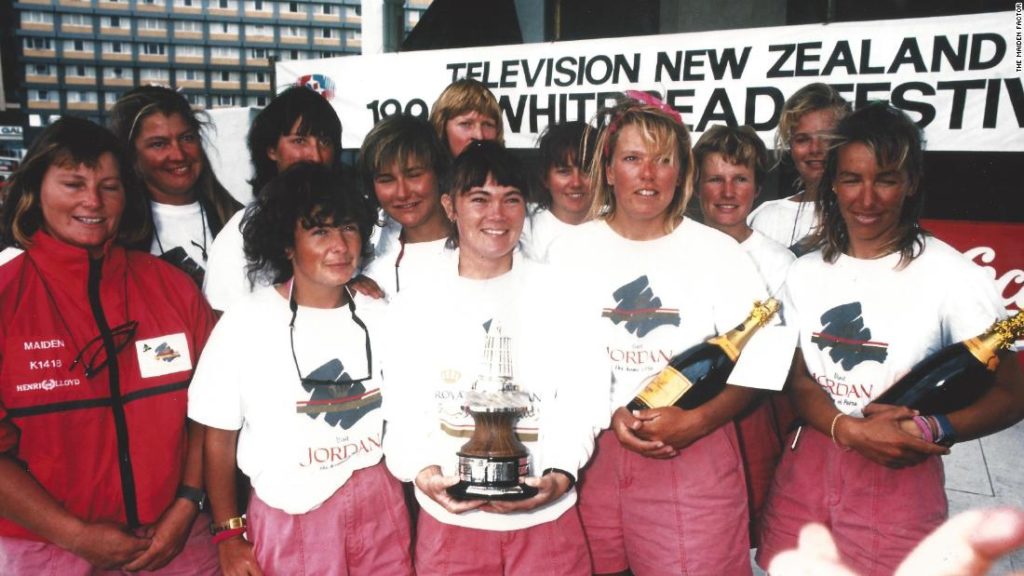
High school dropout turned world renowned skipper turned mother and activist, Tracy Edwards has lived quite the life so far. Edwards is the lead subject of Maiden (2019), a documentary by director Alex Holmes, which tells the story of the 1989-‘90 Whitbread Round The World Race through the eyes of the women who sailed as the first all female crew to compete. Having braved the open ocean, now in various round the world boat races, Edwards is no stranger to adventure, and does not shy away from a challenge. Today Edwards is retired from sailing but she continues to travel around the world inspiring young women and girls to follow their dreams.
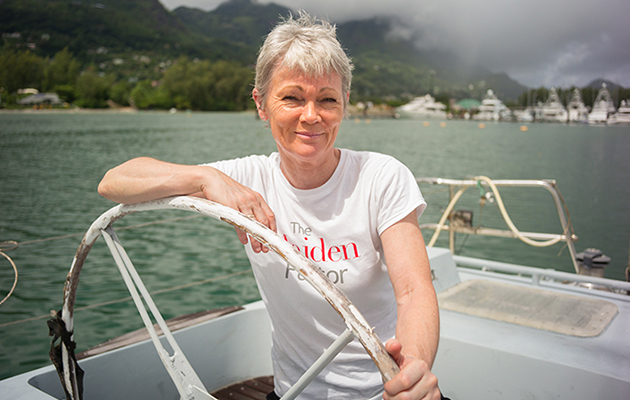
BOSTON HASSLE: So let’s get into it: the movie is amazing. It’s… gorgeous! And something I want to ask you about is the footage that you had from the boat! What was your intention for that? Were you planning on using that—or just documenting as much as you can?
TRACY EDWARDS: So, the Whitbread, that year, decided to give out some cameras to some boats, so they asked for volunteers. Of course, most of the guys were far too important, [imitating] ‘We’re racing, we’re not filming,’ you know? So, we went: “We will! We’ll film!” I think we knew—or we felt that we had to record this, you know? That there must be some record of what we were doing.
Whitbread did use it in a kind of program afterwards… for television. Which was fine, but it was all very much on the surface, you know—here’s some people racing around the world.
But when I met Alex [Holmes], I was talking at his daughter’s school. And he came up to me afterwards and said, “Oh, my God, please tell me no one has made a film of this?” And I went, “No one’s made a film of this?” And he went, “Thank God for that. I’d love to do this film.” So, you know, 25 years after or something…because five years ago, they started this project! It took five years to make this film.
BH: Wow.
TE: I know! Dedication. [Both laugh] But then, you know—he said something like, “I’m thinking, you know, of script writers…” And I was like, “Oh!…Um, okay…” So he said, ”Why do you look like that?” And I said, “Well, why don’t you just use the footage that we’ve got?”—’Cause he’s a documentary maker.
BH: Right [laughs].
TE: And he was like, “You have footage?” I went, “Yeah! We filmed everything!” He could not believe his luck! But then his next question was, where is it? And I went, “No idea…”
BH: Really?! Oh no!
TE: It took two years!—two years to track all that down, all that footage.
BH: Whoa!
TE: So, they started off with—my mum had collected and recorded everything. The news and everything else. So, I gave them her box of— I mean 10 boxes of stuff. So, they started from there and began to realize what there was out there because…we used to get into port and we would hand over our footage, and it would go to news channels and Whitbread and it would get cut and copied. And I mean, God knows what happened to it… So, that was his first sort of clue of where everything was. And then this sort of detective work started. And it took him two years to find it all! I mean, just amazing.
BH: That’s awesome! Yeah, and incredible just how much they came up with in terms of getting it from so many places—
TE: Oh, extraordinary! I mean, none of us had even most of that stuff.
BH: Really?!
TE: Yeah!
BH: Oh, my gosh!
TE: Yeah, we were seeing it for the first time when we saw it up on the screen! [Grins] And I think what was really interesting was—I didn’t realize he had done this deliberately, but of course he did it deliberately—He interviewed us without showing us anything. So the interviews are just from memory. Which I thought was very clever.
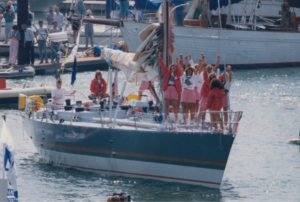
BH: Yeah! And then how did it feel seeing it all put together?
TE: Amazing.
BH: Yeah [smiling].
TE: We all watched it together for the first time in June last year at BAFTA. Family and friends and sort of invited audience. I mean, the reaction was… incredible! We loved it… I think we all found it hard to identify with these younger women on screen, and I—I still look at myself and go, “You’re much more together than I remember.” Or, you hid how not untogether—or not together you were… very well! ‘Cause I remember myself as being a bit of an idiot, you know. This very, you know, together young women, I’m like, “Who are you?“ [laughs]
BH: Wow…
TE: It’s very weird.
BH: Yeah! Do you think that people saw you that way? At the time?
TE: I think—I mean, I don’t know—I can’t speak for the girls. I mean, I know I was a bit of a nightmare to live with… Because we all lived together, we didn’t just work together, we all lived together! Until we got the crew house, where I dispatched them off to the crew house, so I could have my temper tantrums on my own.
BH: Throughout all of the time of getting the boat, getting the funding, and all of that?!
TE: Yep, we were all on top of each other. So, if we didn’t get on, it was going to be a real problem. So, I think that’s how we ended up with this incredibly strong team, because we had to fight so hard to get to the start line! No one had to fight as hard as we did—so, when we got to the start line, we were battle hardened [sneering], ready… to get out there and do what we knew we could do!
And I think you know that disadvantage that we had—of trying to find the money and all the battles—ended up being an advantage because we were so close by the time we started… You know, we had almost been through the worst! We looked at the race and went: “Finally, something we know how to do!”
BH: That’s awesome! So, before—going back to when you first sailed in 1985 around with—
TE: With the guys, yeah.
BH: Yes, it seems like this ‘men’s sailing’ situation that you were kind of walking into, was very much about “athleticism” and all of these words sports will talk about, did you see yourself as an athlete before then? And now, do you?
TE: No. I’ve never seen myself as an athlete or a sports woman.
BH: Really?! Wow!
TE: I don’t see racing around the world as a sport. I see it as a challenge and an adventure… and I mean, it is competitive, so it does put it in the sports category. But you know, I’ve never been in gym in my life. Ever! I mean, I’ve watched the girls go, and thought [gesturing] fill your boots!
BH: Hahaha!
TE: I mean, the ‘85-’86 race—my god!—we’re also unhealthy. Smoking and drinking, you know!
BH: [laughing] Oh my gosh, yeah!
TE: And going back to the gym. Pouring ourselves onto the boat for the start of each leg going “I’m a woman…” And, I mean, it was just a different time. Maiden—the ‘89-’90 race was the transition from amateur to professional.
BH: Uh huh.
TE: So, It became a lot more serious that year. And a lot of sponsored boats, which hadn’t necessarily been the case in ‘85-’86 race—it was more sort of rich guys, you know, sort of owning their boats and racing them around the world.
BH: Oh yeah.
TE: So, there was that transition for sure. We were definitely part of a really interesting time in sailing. But no—none of us really saw ourselves as “sports women.” [grinning] I think something we did really focus on, and it really does come out in the film—when you see the swimsuits—is that we felt like girls. We wanted to be girly girls. We didn’t want to be male clones. You know, it was fine for them to get in with beards, and stinking to high heaven. And you know, “Ahh! [growling]…” like uhh! God! That’s disgusting! So, you know, we would—apart from the swimsuits—we’d put on pink shorts, and our gray T-shirts, and Mickey, who was amazing at braiding, would braid all our hair. Because that’s how he wants to be seen, you know! That when the girls can do this! They don’t have to become men! And I think so often in life, women do feel that they have to become men to succeed, you know? They have to have those male traits, and we fought very hard against that.
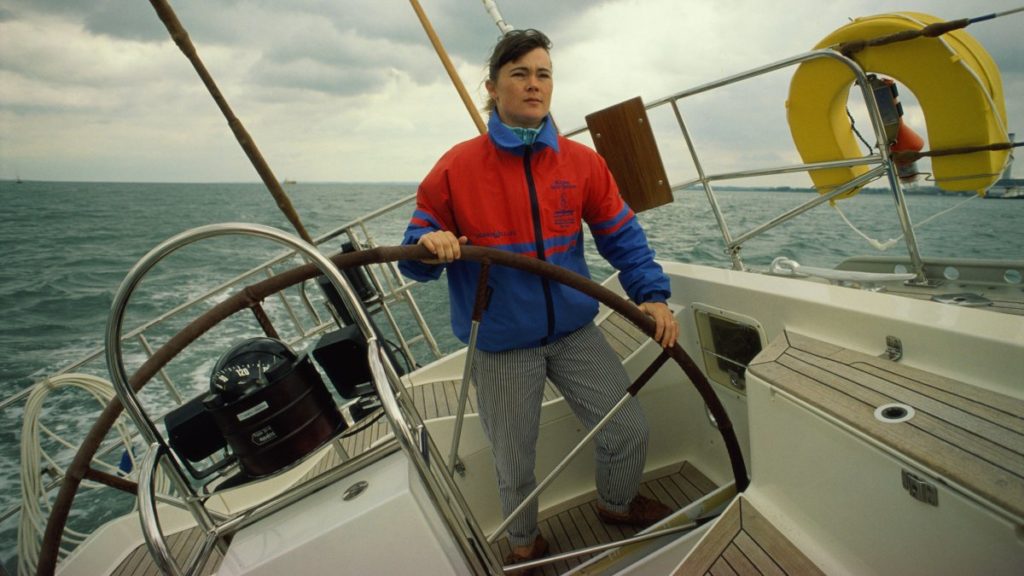
BH: Yeah. Can you talk about past 1990? You know, then… what happened? And have you continued sailing?
TE: Maiden lives on!
BH: Yeah!
TE: I think… well to be perfectly honest, I had a nervous breakdown after Maiden… Not something I would have told you probably even a year ago, but in the year of talking about mental health, I think it’s important… It was overwhelming. I mean, it was too much. We were suddenly famous.
BH: Right.
TE: All the girls went off to different jobs and they were taken by amazing teams, which was brilliant, and I sort of said, “Well, I’ll stay and do the talks, and write the book, and do the interviews,” and I didn’t realize what it would be like to lose everyone so quickly. I mean, within a week, everyone was gone!
BH: Wow.
TE: And it was shocking. And I fell off a cliff, really. I just plummeted into this black hole, and I carried on for a while, pretending everything was fine. And I’m not someone that finds it easy to ask for help, and I really should have done that. So, it came to a point where I just, you know, couldn’t deal with anymore. Went down to Wales. Became a recluse, pretty much, for two years. Just disappeared off the sailing scene. And then I was invited to the Yachtsman of the Year in 1994, and saw Peter Blake and Robin Knox-Johnston who were racing this huge catamaran around the world in the Jules Verne. I thought, “I’m gonna do that!” Howard was sitting next to me he’s like, “Ugh, god! Really?!”
BH: Hahahaha!
TE: So I, sort of arrived back in sailing, mended and ready to go again. So, I did the first and second all female crew to sail around the world. And I really felt at that point—when we finished Maiden we thought, “We’ve made a difference!” And, a couple years later, we went back and said no: “No, we haven’t!”
BH: Oh my gosh.
TE: You know? It’s like life had gone back to normal! So, we’ve got to keep going. So, the non-stop around the world record showed that an all female crew could race a bloody big catamaran that men thought was their last refuge, you know?
Then I did Maiden II. So, when I had my daughter, I did Maiden II. I managed it. And it was the first ever—EVER IN THE WORLD—mixed gender sailing professional racing team. Hugely successful! Brian Thompson and Helen Darvelid skippered the boat. Six girls. Six guys. Awesome. Broke loads of world records… [sighs] No one’s ever done it since and I don’t know why!!
BH: Why?! Yeah, why?!
TE: [groan]
BH: It’s still—
TE: Yeah! It’s just as bad as it ever was. And what did I do then? I put the world’s first ever non-stop round the world race to start and finish in the Middle East. So, I’ve kind of always followed that sort of trend, if you like. And then when I retired completely from sailing, I went into Child Protection. Worked with the NSPCC and CEOP, child protection online, which was just sort of becoming a thing at that time.
And then, really started getting involved a lot of girls’ educational charities. Education is the key to everything. And I just thought, if we can’t change it here, maybe we can change it here [gesturing], you know? And we can empower girls. And you know, King Hussein supported us and and look at what we did! And, I just think, if people support girls, what they can do—when you educate a girl—what you achieve is extraordinary! So when Maiden kind of burst back into my life in 2014—just as Alex was starting to make the documentary, I mean it was so surreal!
BH: Right!
TE: Like, here’s the documentary [gesturing] and here’s Maiden back. I mean, it was just like full circle! So, we rescued her, and brought her back to the UK, and we restored her. And, you know, we were like, “what are we going to do with the boat?” And it was my daughter who said to me, “Why don’t use the boats raise money for the girls educational charities that you’re a patron of?” And we were like “Brilliant!”
And, you know, she’s just so inspirational, Maiden, and people—still, when they see her, they’re like “Wow! That’s Maiden.” She has this aura—[laughing] I don’t know if that’s just me… But I don’t think it is just me!
[Both laughing]
TE: She’s now sailing around the world on a two year world tour. We have hundreds of school kids down to the boat.
BH: Gosh, I’m sure.
TE: And it’s just such a great example to them. Like, look, you know… just get out there and do it! And it doesn’t matter if you don’t succeed the first time, you know? Look at me, I was a dropout, and if I can do it—quite frankly, if you guys are still in school, you’re ahead of me already! So, go on and do it!
And we’re going to give talks at schools, we have a schools program, and so it’s all just beautifully all linked up! As the film is going around the world, Maiden is going around—I’d love to say we planned that, but we didn’t. It’s just complete chance.
BH: Yeah, isn’t that amazing? So much of this is about freedom, like you talk about in this really profound way. And I feel like watching the film, you really think about, you know, if you were leaving with this boat. You’re going—as an audience member—on a journey with you all.
TE: Yeah.
BH: And watching it unfold as you go, and all of these issues that you come up against. It’s so amazing, we get to see everything as it goes, and watch you navigate the entire world—the Earth—and the ocean. And now you’re doing the same!
TE: Yeah!
BH: It’s paralleling—right?—to what you’re doing now in trying to empower women and girls.
TE: I think what’s really great about Maiden going around again, is she’s crewed by another all female crew, and all of then were inspired by Maiden. And, now they’ve come to help us take me around the world. And I’m just, [speaking quietly] “I love this!”
[Both laughing]
BH: And maybe it’ll keep a wheel like that going.
TE: Absolutely! I think, you know, people said to me, “Do you have any regrets about Maiden?” My only regret is that we didn’t keep the momentum going. I think we were lulled into a false sense of, “Oh, things have changed!” And now thirty years later I’m still having the same conversations. So, not so much. [laughs] They haven’t.
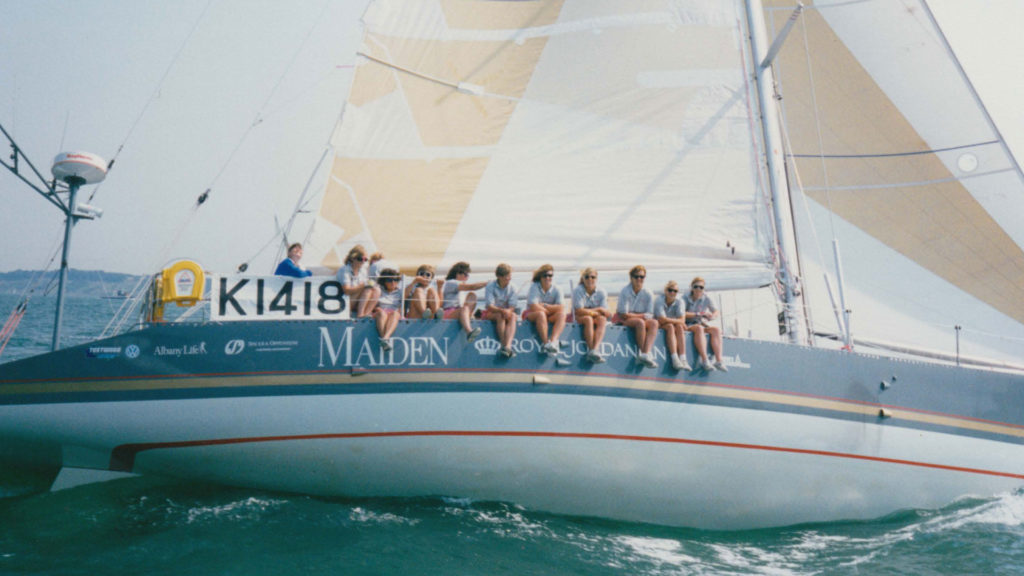 BH: Yeah, can you speak to the community of the crew? And then also, everyone who was just there at the time? Like, do you find yourself still frustrated with the same people that you were frustrated with then? Or is it all, kind of, copacetic?
BH: Yeah, can you speak to the community of the crew? And then also, everyone who was just there at the time? Like, do you find yourself still frustrated with the same people that you were frustrated with then? Or is it all, kind of, copacetic?
TE: I think it’s… I read a really great quote the other day, I wish I could remember it exactly. But it’s about patriarchy. Equality is not about men stopping women. It’s about patriarchy. And that is a very hard thing to fight because it’s tradition, and it’s culture, and it’s government, and the forces that you can’t see, if you like. I very rarely speak to individual men who don’t agree that equality is the best thing. Any man with a daughter will say, “Of course, we need equality. I don’t want my daughter going through what you’ve been through.” So it’s the collective. And that’s, as I say, hard to fight because it’s indefinable.
You know, it’s the same with the guys on the boat. If you speak to them individually, and they will all say to you, “Yeah, we don’t think there’s anything wrong with having a girl on the boat.” But they would never say that when they’re together as a crew. Not one of them would raise their hand and say, “Yeah, we can’t have a woman on the boat. We shouldn’t have any women on the boat.” So you know, it’s a continual struggle. And it’s not just in sports, it’s in everything. I think we are seeing changes, but I think there’s an underlying sexism that, you know, when men aren’t thinking about it, it just slips out.
And this is why I love reaching children at an early age, because we speak at schools, to girls and boys. And we have boys saying to us, “Well, I don’t understand why people think that girls aren’t equal.” And we’re like, “Lord mate, you hold that thought. Don’t grow up!”
BH: Don’t learn any different!
TE: You’re right! It is learned behavior. Kids don’t see a difference. Right? You know, so I think if we can educate in that way, I have huge hope for the future of the next generation.
BH: Oh, yeah. Thank you. I feel like you have this incredible way of saying so much very eloquently. I think it’s a very nice for everyone else. It’s impressive. I guess if you hadn’t done sailing? Where do you think you would be?
TE: Well, I tried to be an actress and a dancer. I went to arts educational school before I ended up in Wales at the nightmare school. I would have been an average dancer. Possibly good actress. I don’t know. [Both laugh] No, I yeah. Sailing was just a bit of a, you know, sidewinder, or it blindsided me.
BH: Yeah. Are you happy that it did?
TE: Oh, yeah! Yeah, I love my life. And it needs to become more equal. Otherwise, we’re missing out 50% of the population. There are such incredible women sailors out there now. I mean, truly, legendary women who are so skilled and so amazing, much more than we were—leagues above what our level was. And you know? When guys do take women on boats, they love it! And they do really well! It’s just we’ve got to reach that plateau where it’s the norm.
Maiden
2019
dir. Alex Holmes
97 min
Now playing at Coolidge Corner Theatre & Kendall Square Cinema

